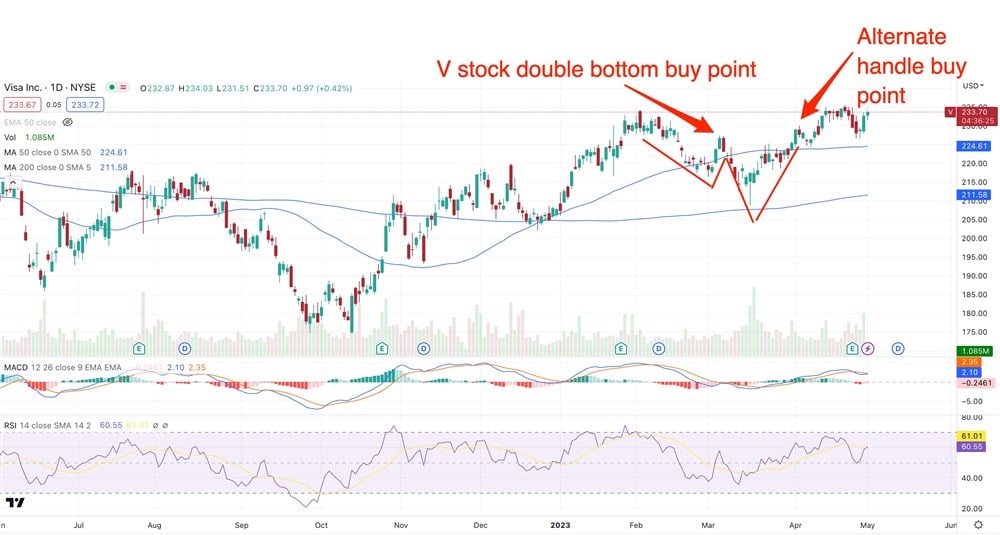Global payment processor Visa Inc. NYSE: V is in a buy range after breaking out from a double-bottom base with a buy point north of $227.42.
The stock initially pulled back after earnings before rebounding, although its price movements in recent days largely tracked the S&P 500, of which Visa is the 14th largest component, with an index weighting of 1.085%.
Visa earnings of $2.09 a share in the second quarter beat analysts’ views, as did revenue of $7.98 billion. Data compiled by MarketBeat show the company exceeding top- and bottom-line expectations in every quarter since October 2020.
Wall Street’s consensus view on the stock is “moderate buy,” as Visa analyst ratings show. The price target is $260.96, an upside of 12.48%.
Double-Digit Growth
The company grew both earnings and sales at double-digit rates in the past eight quarters. Those rates are slowing, but that can be attributed to easy year-over-year comparisons in 2021, something many companies and industries experienced as consumer and business spending rebounded that year over a moribund 2020.
A post-pandemic rise in travel, along with an increase in digital payments, are fueling Visa’s growth.
Smaller rival Mastercard Inc. NYSE: MA is on a similar trajectory as it also posts year-over-year growth, albeit at a slower pace as rates gradually normalize from the whopping increases in 2021.
Despite the macroeconomic uncertainty acknowledged by Visa CEO Ryan McInerney, analysts see the company growing earnings by 14% in 2023 and 2024.
No Disruption From Bank Failures
Visa and Mastercard were essentially immune from any direct fallout related to the March failure of Silicon Valley Bank and the recent meltdown at First Republic Bank, whose assets are being purchased by JPMorgan Chase & Co. NYSE: JPM, following a Fed seizure.
In regulatory filings, Visa addressed the bank failures, saying, “These events did not have an impact on our operating results. We continuously monitor and manage balance sheet and operational risks from clients in our portfolio, including their settlement obligations.”
Although Visa and Mastercard don’t have direct exposure to interest-rate risk, their revenue could suffer if consumers and businesses curtail spending due to inflation or recession, or both.
Visa and Mastercard are not banks. They are payment networks that facilitate transactions between cardholders, merchants, and banks. That business model means they don’t carry balances on their books as banks do.
Instead, the payment processors generate revenue by charging fees to the banks that issue their cards, and to merchants that accept their cards. These fees are typically a percentage of the transaction value and vary according to numerous factors.

Shareholder Payouts
The Visa dividend yield is 0.77%. The company has a 14-year track record of increasing its dividend. The current dividend per share is $0.45.
The company also has a share repurchase program; during the first three months of this year, Visa repurchased 10 million common shares at an average cost of $222.09 per share, totaling $2.2 billion. As of March 31, it had $11.8 billion of remaining authorized funds for share repurchases. The current annual yield on buybacks is 2.02%.
Institutions On Buying Spree
Visa institutional ownership data show that buyers are clearly in charge, with 2,472 institutions accounting for $33.58 billion in total inflows in the past 12 months, versus 2,083 institutions accounting for $22.65 billion in outflows.
On a one-year basis, Visa stock is up nearly 10%, ahead of the S&P 500 and the Dow Jones Industrial Average, of which it’s also a component.
On May 1, Visa stock opened higher, in tandem with the broad market. The stock will remain in buy range as long as it’s no more than 5% above a buy point near $227.42, or a few cents more.
If you want to extend that range, you can use an alternate buy point north of $230.05, where the stock formed a handle on the double bottom base.
Before you consider Visa, you'll want to hear this.
MarketBeat keeps track of Wall Street's top-rated and best performing research analysts and the stocks they recommend to their clients on a daily basis. MarketBeat has identified the five stocks that top analysts are quietly whispering to their clients to buy now before the broader market catches on... and Visa wasn't on the list.
While Visa currently has a Moderate Buy rating among analysts, top-rated analysts believe these five stocks are better buys.
View The Five Stocks Here
MarketBeat just released its list of 10 cheap stocks that have been overlooked by the market and may be seriously undervalued. Enter your email address and below to see which companies made the list.
Get This Free Report